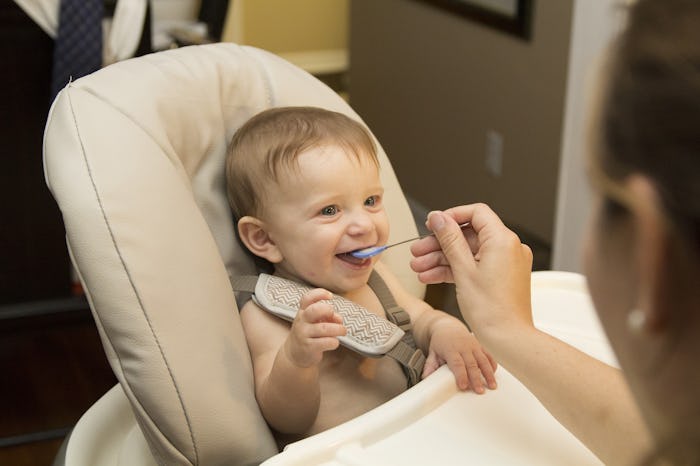Most parents need to save money any way they can, and even those not under financial strain likely care about unnecessary waste. Many moms have no qualms about compromising the expiration dates on canned food that they'll be eating themselves, but should you be more cautious with your little ones? How long does baby food really last after the expiration date?
According to Dr. Michelle Davenport, dietician and co-founder of Raised Real, "The average store-bought baby food sits on shelves for at least two years, and many have expiration dates that extend to three years. Store-bought baby food should be thrown away by the 'use by' date. Beyond this date, it has deteriorated to a point where the food loses nutrition and/or becomes a food safety hazard. When it comes to babies, nutrition and food safety are paramount, so it's not worth taking a risk."
So how exactly does a jar of baby food last up to three years before consumption? In an interview with Romper, Davenport says that in order to make baby food shelf-stable, manufacturers blast it at high temperatures, which breaks down nutrition and concentrates sugar. It's possible that what you're gaining in convenience, you're losing in nutritional content.
Davenport is a proponent of homemade baby food, which she attests contains twice the nutritional value and half the sugar of prepared shelf brands, but not every parent is keen on the idea of making their own puréed vegetables. If you decide purchasing store-bought baby food is the better fit for your family's lifestyle, it is recommended that you do carefully heed the expiration date and throw out jars whose time has passed.
More and more parents are opting to buy baby food in pouches rather than jars for easy transportation and mess-free feeding. In this case, one extra precaution is necessary — check to make sure the pouch looks and feels normal. Swollen or leaky pouches could signal contamination, and should be discarded or returned to the store immediately. Store-bought baby food can't be beat when it comes to convenience, but what goes inside your child is one area you don't want to push the limits of health and safety on. Save that for skipping baths.
